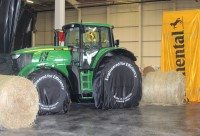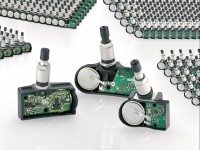Divestment drives up Trelleborg’s Q2 2016 profit
For Swedish firm Trelleborg AB the second quarter was, according to president and CEO Peter Nilsson, “particularly eventful.” The acquisition of Mitas parent company CGS was finalised during the three months to 30 June 2016 and the operations consolidated into Trelleborg’s financial statements for the month of June. “The integration of CGS into our existing operations has begun and is progressing well,” comments Nilsson. The company also “devoted considerable time during the quarter” to complete the sale of its holding in Vibracoustic to partner Freudenberg.
Net sales for the second quarter of 2016 remained at approximately the same level as a year earlier, despite the positive influence of CGS on Trelleborg’s figures, and came to SEK 6.54 million (£576.7 million). EBIT (excluding items affecting comparability) rose two per cent to SEK 889 million (£79.3 million), while EBIT margin grew from 13.5 to 13.7 per cent. Net profit shot up 549 per cent to SEK 4.91 billion (£432.9 million) thanks largely to the sale of the company’s Vibracoustic share.
While organic sales within the Trelleborg Wheel Systems business unit only increased one per cent year-on-year during the second quarter, the contribution delivered by the newly-acquired CGS business helped overall unit sales to rise 30 per cent, to SEK 1.47 billion (£129.6 million). Sales of original equipment tyres to agricultural machinery manufacturers increased in Europe, North America and Asia, while aftermarket tyre sales were stable and outperformed the underlying market. The business area continued to grow market share in selected agricultural tyre sub-segments, however sales of tyres for materials handling and construction vehicles declined during the quarter. Higher sales in the European market could not fully offset the weak trend in North America.
Within the Trelleborg Wheel Systems business unit, EBIT and EBIT margin improved year-on-year to SEK 126 million (£11.1 million) and 12.6 per cent respectively due to the consolidation of the CGS tyre business on 1 June, and was also helped by higher agricultural tyre volumes and effective cost control. Integration costs related to CGS and ongoing start-up costs attributable to Trelleborg’s new facility for agricultural tyres in the US had a negative impact of approximately SEK 10 million on EBIT during the quarter.
Looking forward, Nilsson says the integration of CGS is “now at the top of our agenda” and he shares that Trelleborg has “identified significant coordination gains that we plan to leverage.” Nevertheless, the president and CEO describes future business trends as “difficult to assess” and notes that the Brexit vote in the UK has “increased the prevailing economic uncertainty.” The company expects its markets to continue moving laterally or slightly downward during the third quarter, mainly due to the continued decline of its oil and gas operation. Following the acquisition of CGS, Trelleborg anticipates annual sales of approximately SEK 30 billion (£2.6 billion) on a pro forma basis.
Further information on Trelleborg’s Q2 2016 results can be found in our company profiles & reports section.




Comments